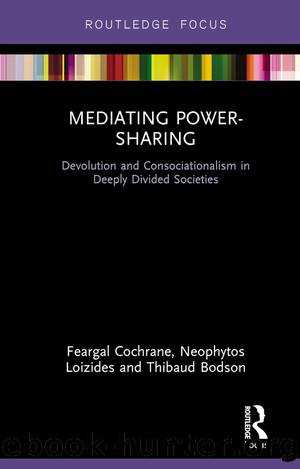Mediating Power-Sharing by Feargal Cochrane & Neophytos Loizides & Thibaud Bodson

Author:Feargal Cochrane & Neophytos Loizides & Thibaud Bodson
Language: eng
Format: epub
Publisher: Routledge
Published: 2017-12-16T00:00:00+00:00
The current institutional structure of the BCR: a case of cooperation
The several reforms of the BCR resulted in a rather sophisticated institutional architecture. This institutional architecture can be seen as a two-sided coin. On one side, it provides for strong protection mechanisms for the Dutch-speaking minority in Brussels. In turn, these protection mechanisms require a high degree of cooperation between the parties in order to avoid any institutional stalemate. This emphasis on cooperation represents the other side of the coin. Mechanisms protecting the Dutch-speaking community, and thus calling for inter-group cooperation in the BCR, are presented in the next paragraphs.
Given the bilingual status of Brussels, the parliament has been organized from its creation into two language groups. Each political party running for the regional elections in Brussels must therefore be registered in the FSG or in the DSG. A list cannot be registered in both groups. Let us note that this system owes some similarity to the community designation function for members elected to the assembly in Northern Ireland. On election day voters can decide whether they want to vote for candidates belonging to the French-speaking or the Dutch-speaking lists (Coffé 2006, 100). In a region where citizens have a more or less acute sense of belonging to a language group, and considering that group identities may or may not be fixed for voters,39 it was thought inappropriate to lock them into a group. Article 23 of the 1989 Brussels Act specifies that members elected from Dutch-speaking lists constitute the DSG, whereas members elected from French-speaking lists constitute the FSG in the BCR parliament. The parliament consists of 89 seats, with the FSG automatically receiving 72 seats and the DSG being allocated 17 seats. Its members are elected for a period of five years.
Besides this guaranteed representation, the Dutch-speaking minority benefits from other protection mechanisms within the BCR parliament (Bodson, Loizides 2017). Most important among these mechanisms are the double majority rule and the âalarm bellâ procedure. The double majority rule implies that for certain matters a double majority â that is, a majority in the whole parliament plus a majority within each language group â is required to adopt a draft of law.40 In turn, the âalarm bellâ procedure provides that when three-quarters of the members of a language group consider that a draft of law threatens the relationship between both communities in Brussels, they can trigger an alarm bell.41 This will suspend the legislative procedure and the issue will be referred to the BCR government for arbitration. Then, the proposed law, possibly amended by the government, is again submitted to the parliament for a vote.42 The alarm bell is similar in nature to the âpetitions of concernâ in the Northern Ireland Assembly, which give each community group a veto over certain issues.
Several mechanisms protecting the Dutch-speaking minority also exist at the government level. Articles 34 and 35 of the 1989 Brussels Act set the rules for the election of the government in the BCR. The government comprises one minister-president and four ministers.
Download
This site does not store any files on its server. We only index and link to content provided by other sites. Please contact the content providers to delete copyright contents if any and email us, we'll remove relevant links or contents immediately.
| Africa | Americas |
| Arctic & Antarctica | Asia |
| Australia & Oceania | Europe |
| Middle East | Russia |
| United States | World |
| Ancient Civilizations | Military |
| Historical Study & Educational Resources |
The Third Pole by Mark Synnott(709)
Money for Nothing by Thomas Levenson(663)
The Economist (20210109) by calibre(624)
Christian Ethics by Wilkens Steve;(607)
Made in China by Anna Qu(585)
100 Posters That Changed The World by Salter Colin T.;(540)
The Irish Buddhist by Alicia Turner(527)
Reopening Muslim Minds by Mustafa Akyol(520)
The Age of Louis XIV: The Story of Civilization by Will Durant(508)
Routledge Handbook of Contemporary India by Knut A. Jacobsen(504)
Nonstate Warfare by Stephen Biddle(499)
Ideology by Eagleton Terry;(492)
Culture by Terry Eagleton(490)
The Great Pyramid Void Enigma by Scott Creighton(486)
The Shortest History of China by Linda Jaivin(471)
Objects of Vision by Saab A. Joan;(460)
Banaras: CITY OF LIGHT by Diana L. Eck(456)
The Jews of Silence: A Personal Report on Soviet Jewry by Elie Wiesel(455)
Sybille Bedford by Selina Hastings(451)
